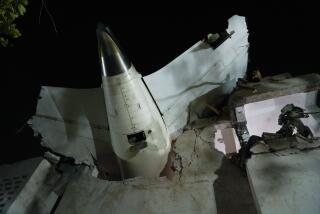Boeing Likely Loser If U.S.-China Talks Fail
- Share via
As the 11th hour approaches in the contentious U.S.-China trade talks, Boeing Co. once again finds itself a likely victim in Uncle Sam’s battle against widespread piracy of videos, software and music.
It is not the first time the Seattle-based aerospace giant has been used by the Chinese as a high-visibility bargaining chip and it probably won’t be the last, given Boeing’s preeminent position among U.S. exporters and China’s fast-growing trade surplus with the United States.
Boeing executives, heartened by news of progress as a Sunday deadline looms, are hopeful there will be another last-minute agreement on intellectual property protections by Friday night. That would prevent the Clinton Administration from imposing $1 billion worth of sanctions on Chinese goods such as bicycles and greeting cards, which would trigger a host of retaliatory sanctions from China.
Aerospace products are not on China’s official sanctions list, but a China Southern Airlines official said last week that Boeing could lose a $2-billion order for its 777 jetliner to its European rival, Airbus Industrie, if the trade sanctions are imposed.
On several previous occasions, Chinese officials have threatened to cancel Boeing orders if a trade controversy--such as President Clinton’s renewal of China’s most-favored-nation trade status last year--was not settled amicably. To date, the threat has not been carried out.
Boeing’s unenviable position as the U.S. company most likely to appear on China’s hit list is a comment on its high visibility--it controls more than 60% of the Chinese market--and the complexities of the global economy.
Few expect China to sever all its extensive business ties with Boeing, given the country’s expanding appetite for technology and capital to jump-start its fledgling aerospace industry. Boeing purchases parts for its 737, 747 and 757 jetliners from Chinese manufacturers in Xian and Shenyang and has said it will invest $100 million to open field service offices in 16 Chinese cities and help establish pilot training and air safety programs.
But analysts believe the Chinese government could easily delay or even cancel a Boeing order or two and play up a sale to the Europeans to drive home a political point.
“This is a situation where the Chinese have a great deal of potential leverage to manipulate the situation without it having a profound or long-term repercussion on Boeing’s relationship with (China),” said David Bachman, chairman of the China studies department at the University of Washington in Seattle.
St. Louis-based McDonnell Douglas Corp., the other major U.S. commercial jetliner company, is spared such high-visibility threats because it is a much smaller player and has developed close ties with Chinese government and aerospace officials through a co-production arrangement with partners in Shanghai, according to analysts.
Douglas Aircraft Co., the company’s commercial aircraft division, began building airplanes in China in 1987 and recently signed a $1.6-billion agreement that involved China’s purchase of 20 MD-80s and MD-90s and the manufacture of 20 MD-90s in China. The jetliners purchased by China would be built at the Douglas plant in Long Beach.
With its threat against Boeing, the Chinese government has pitted two important segments of the U.S. economy against each other. U.S. entertainment and high-technology companies are the most vocal proponents of tougher action to stop the Chinese pirating, which they say results in billions of dollars in lost sales in China and other Asian markets. This issue is far less important to the aerospace companies, whose main concern is capturing a bigger share of an aerospace market that now ranks third in size behind the United States and Japan.
Boeing estimates China will need 1,230 new airplanes worth about $66 billion over the next two decades.
Airbus Industrie, the European consortium, opened an office in Beijing last year and has stepped up efforts to expand its share of the market. To date, Chinese airlines have taken delivery of 25 Airbus planes with orders for 14 more.
David Venz, a North American spokesman, insists that Airbus isn’t counting on profiting off a trade war between the United States and China.
“In many ways we’re not more than bystanders like a lot of other folks,” he said. “It’s difficult to say whether we view this as a concrete threat or positioning opportunity.”
But with Airbus waiting on the sidelines, Boeing is a reluctant recruit to the piracy battlefield.
“Officially, as a good corporate citizen of the United States, I think we went on record saying we supported the action (U.S. Trade Representative Mickey Kantor) took,” said Lawrence Clarkson, a Boeing senior vice president. “But we are very anxious for them to settle the issue before it really results in sanctions and retaliatory counter-sanctions.”
Aerospace manufacturers have intellectual property concerns of their own. Great care is taken to prevent competitors from gaining access to the complexities involved in the design, production and sale of $60-million-plus machines containing thousands of parts and bursting with cutting-edge technology.
But “pirating” a jet aircraft, as opposed to pirating a copy of a “Lion King” video, is all but impossible. Spokesmen for Boeing and McDonnell Douglas said they have no intellectual property concerns in China, which is a relative newcomer to the aerospace manufacturing scene.
* U.S.-CHINA TALKS
U.S. and Chinese officials engage in 11th-hour trade negotiations. D2
More to Read
Inside the business of entertainment
The Wide Shot brings you news, analysis and insights on everything from streaming wars to production — and what it all means for the future.
You may occasionally receive promotional content from the Los Angeles Times.








